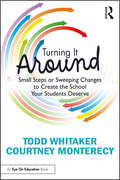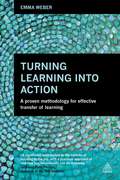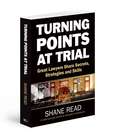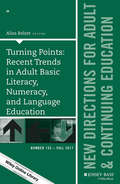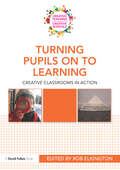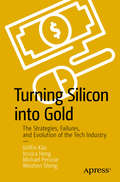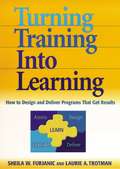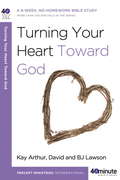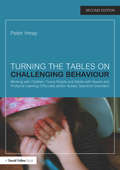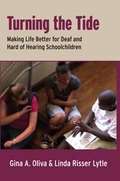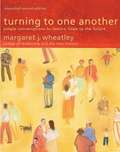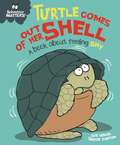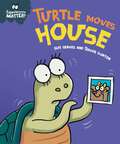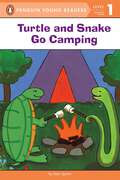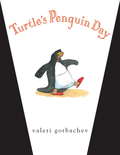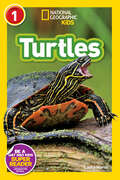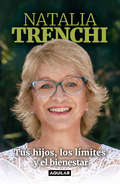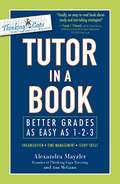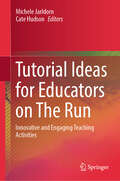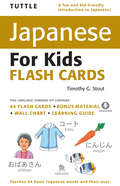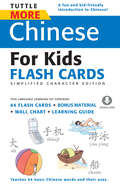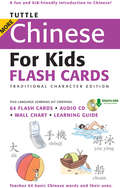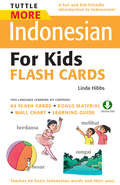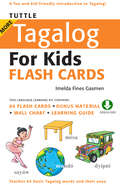- Table View
- List View
Turning It Around: Small Steps or Sweeping Changes to Create the School Your Students Deserve
by Todd Whitaker Courtney MonterecyWhat needs to be improved at your school? In this essential new book, Todd Whitaker and Courtney Monterecy provide a clear roadmap to making the changes that will bring lasting benefits to your students and staff, whether those changes are small tweaks or larger overhauls.You’ll learn step-by-step ways to diagnose the issues and listen to your staff about what needs to change, to hire more effectively and improve the teachers you have, to implement structures and coaching to address student behavior, and to communicate before you need to. Whitaker and Monterecy also show you how to grow as a leader by making time for what only you can do, by developing other leaders within the building, and by always communicating your why. Each chapter is filled with helpful strategies and inspiring true stories.With this book's wisdom and practical takeaways, you will have the courage and know-how to implement the important changes your students truly deserve.
Turning Learning into Action
by Emma WeberLearning transfer is the missing link in training. Using conventional approaches to training, an average of just 10-20% of learning makes it back into the workplace and contributes to better business outcomes. With the current increased emphasis on efficiency and cost-effectiveness, such a dismal record is no longer acceptable. To improve these statistics and to make training truly valuable we must recognise that successful learning is not just about good content and well executed programmes but about finding ways to facilitate genuine behavioural change and accountability back in the workplace. This book provides the necessary tools to enable trainers, buyers of training and L&D professionals to do just this. It presents the new, proven TLA methodology, which acknowledges the important role of ADDIE in the instructional design process but takes learning a step further. TLA focuses on the fact that to generate significant behavioural change, consistent, systematic follow-up after the training event is critical.
Turning Points At Trial: Great Lawyers Share Secrets, Strategies And Skill
by Shane ReadThirteen of the greatest lawyers in the country, such as Robert S. Bennett, Alan Dershowitz, Mark Lanier, Bryan Stevenson, and Tom Girardi share with you the powerful secrets from their most interesting cases, from depositions to trials to appeals. Lawyers can apply these techniques immediately in their practice. Non lawyers will get a front row seat to these fascinating lawyers and the turning points in their most intriguing cases. There are also 447 tips summarized in chapter checklists. Leaders of the best litigation organizations and judges have called Turning Points the best trial advocacy book. In addition, the book's website has related audio and video clips that enhance the lessons that are taught. Today's most successful lawyers benefit from the wisdom described in this book and now you can too.The book is divided into seven parts: opening statement, direct examination, cross-examination, cross-examination of the expert witness, closing argument, deposition, and appellate oral argument. In each part, there are chapters that profile an attorney famous for his or her skills and an analysis of court transcripts where that skill was displayed. For example, chapter one features Mark Lanier, who has achieved nationally recognized record-setting jury awards. Lanier candidly reveals his strategies and secrets for creating a spellbinding opening statement. The author, an accomplished trial attorney and highly acclaimed teacher, then extensively analyzes a court transcript from one of Lanier's famous trials so you can learn the building blocks for an opening statement and apply Lanier's techniques at your next trial. At the end of the chapter, there is a checklist that summarizes Lanier's tips.Other chapters feature highly acclaimed lawyers such as Alan Dershowitz who explains the key to a successful cross-examination and Lisa Blatt, the woman with the most appearances before the U.S. Supreme Court, who shares her secrets for a successful oral argument. In short, this book will teach you everything you need to know from deposition to trial to appellate oral advocacy from
Turning Points: Recent Trends in Adult Basic Literacy, Numeracy, and Language Education: New Directions for Adult and Continuing Education (J-B ACE Single Issue Adult & Continuing Education)
by Alisa BelzerMilestones for adult basic education include: It was first federally funded in 1964. The National Literacy Act passed in 1991. The Workforce Investment Act (WIA) of 1998 was enacted. The field then remained relatively static until 2014 when: a new version of the GED® test was launched, new content standards were developed, new data on adult cognitive skills were released, and the Workforce Innovation and Opportunity Act (WIOA), with its laser focus on employment and training, was enacted. This volume reviews where the field is in relation to these turning points and discusses where it could go. Taking up critical discussions of the many recent and influential changes as well as topics of enduring interest, this volume will be valuable to practitioners, researchers, and policy makers. This is the 155th volume of the Jossey Bass series New Directions for Adult and Continuing Education. Noted for its depth of coverage, it explores issues of common interest to instructors, administrators, counselors, and policymakers in a broad range of education settings, such as colleges and universities, extension programs, businesses, libraries, and museums.
Turning Pupils on to Learning: Creative Classrooms in Action
by David FultonTurning Pupils on to Learning documents and makes visible how creative learning approaches can engage and motivate children in their learning. The book features six case studies of creative learning projects that cover the early years through to Key Stage 3 which are written by the teachers and creative practitioners involved. From the creation of
Turning Silicon into Gold: The Strategies, Failures, and Evolution of the Tech Industry
by Griffin Kao Jessica Hong Michael Perusse Weizhen ShengA few square miles of Northern California contain some of the world’s largest companies whose products affect billions of people every single day. What made these giants of Silicon Valley as impactful as they are? What do their paths to success have in common? Turning Silicon into Gold is a sharp analysis of 25 case studies examining just that. Authors Griffin Kao, Jessica Hong, Michael Perusse, and Weizhen Sheng provide relevant commentary as they explore the stories behind companies such as Apple, Amazon, OpenTable, and many more. These organizations used unique problem-solving strategies to forever change the face of tech—whether it was Facebook’s second mover advantage over MySpace or Nintendo’s leap of faith in the 1980s to revitalize the video game industry. Learn by example as Turning Silicon into Gold divulges the inner workings behind some of the most significant business decisions in tech history. The nuanced ways these companies tackled emerging markets and generated growth in uncertain times is essential knowledge for modern business leaders, innovators, and aspiring founders. Whether you are simply curious about the origins of the world’s tech giants or you are an entrepreneur looking for inspiration, the thoughtful, comprehensive case study collection that is Turning Silicon into Gold belongs on your bookshelf.What You Will LearnUnderstand why companies like Amazon, Facebook, OpenTable and more have made some controversial and strategic decisionsRealize how Big Data is driving the success of many new and mature venturesSee how tech companies are tackling emerging markets and generating growthExamine how capital flows through the tech industryWho This Book is ForThe book is for people currently in or interested in exploring a career in the intersection of technology and business, such as product management, entrepreneurship, or non-coding positions at a tech company—it’s also great for people generally curious about how the tech industry operates. The book offers case studies in an engaging and approachable way, while still providing important takeaways and probing questions—perfect for the casual reader or even someone trying to prepare for interviews.
Turning Training into Learning: How to Design and Deliver Programs That Get Results
by Sheila W. Furjanic Laurie A. TrotmanJust as you can lead a horse to water, but it won't necessarily drink, so you can give an employee training, but he may not actually learn...unless, of course, the trainer uses this insightful new book. Turning Training into Learning provides a specific, tested method for making sure training equals real learning. Written for anyone who must train others, this step-by-step guide shows exactly how to create a program that engages trainees and ensures that they remember and use what they've learned when they get back to work. Readers learn how to: * Analyze exactly what a particular trainee needs * Establish a safe environment where questions are welcomed * Demonstrate to learners why the training is relevant to them * Understand the process by which adults learn * Place real learning within the context of the traditional training cycle: assessment, design, delivery, and evaluation.
Turning Your Heart Toward God: A 6-week, No-Homework Bible Study (40-Minute Bible Studies)
by Kay Arthur David Lawson B. J. LawsonDiscover What It Really Means to Be Blessed. In the Sermon on the Mount, Jesus identified attitudes that bring God's favor: weeping over sin, demonstrating meekness, showing mercy, nurturing peace, and more. Some of these phrases have become so familiar that we've lost sight of their meaning. In this powerful study, you will gain a fresh understanding of what it looks like to align your life with God's priorities. Here you will discover anew why the word blessed mean walking the fulness and satisfaction of God, no matter your circumstances. As you look closely at the meaning behind each of the Beatitudes, you will see how these truths can shape your choices every day--and bring you closer to the heart of God. 40 Minutes a Week Could Change Your Life! The 40-Minute Bible Studies series from the teaching team at Precept Ministries International tackles the topics that matter to you. These inductive study guides, designed to be completed in just six 40-minute lessons with no homework required, help you discover for yourself what God says and how it applies to your life today. With the leader's notes and Bible passages included right in the book, each self-contained study is a powerful resource for personal growth and small-group discussion.
Turning the Tables on Challenging Behaviour: Working with Children, Young People and Adults with Severe and Profound Learning Difficulties and/or Autistic Spectrum Disorders
by Peter ImrayFully updated, and with new sections on behaviourism, attachment disorders, neuro-scientific developments and working with dis-engaged learners, this second edition of Turning the Tables contains real-life case studies, strategies for identification and handy hints and tips throughout. It is the authoritative guide to tackling challenging behaviour and working effectively with children, young people and adults with severe learning difficulties (SLD), profound and multiple learning difficulties (PMLD) and those on the autistic spectrum with a dual ASD and learning difficulties diagnosis. With a unique approach, the author stresses the need to diagnose not only the correct difficulty but the degree of learning difficulty for a lasting resolution, as well as tackling common behavioural problems such as attention needing and task avoidance. Chapters are split into three specific areas, SLD, PMLD and ASD/SLD, covering: the 'Magnificent Seven' fundamental principles of challenging behaviour strategies for correct identification of the main area of learning difficulty improving teaching methods and strategies to resolve challenging behaviour, including handy hints and tips when things don’t go to plan extensive use of real case studies to illustrate strategies for resolution guidance on writing your own Behaviour Support Plan. This is a practical and authoritative guide to dealing with the myriad of challenging behaviours that constantly puzzle practitioners. It is an essential read for all professionals, parents and carers working with children, young people and adults with SLD, SLD/ASD and PMLD.
Turning the Tide: Making Life Better for Deaf and Hard of Hearing Schoolchildren
by Gina A. Oliva Linda Risser LytleBoth Gina A. Oliva and Linda Risser Lytle know what it is like to be the only deaf student in a mainstream school. Though they became successful educators, they recognize the need to research the same isolation experienced by other deaf and hard of hearing persons. In this way, they hope to improve education for current and future deaf students. Their efforts have culminated in Turning the Tide: Making Life Better for Deaf and Hard of Hearing Schoolchildren. Turning the Tide presents a qualitative study of deaf and hard of hearing students who attended mainstream schools. The authors conducted three focus groups in different regions in the country, enlisting six to eight participants with diverse backgrounds for each session. They also gathered information from 113 online respondents who answered the same questions used in the focus groups. The respondents discussed many issues, including the difficulties of finding friends and social access, the struggle to establish an identity, the challenges of K-12 interpreting and class placement, and the vast potential of summer and weekend programs for deaf students. Their empowering stories clearly demonstrate that no deaf or hard of hearing student should be educated alone. The authors also elicited comments on other changes that parents, advocates, and other allies could work toward to improve further the educational environment of deaf children.
Turning to One Another: Simple Conversations to Restore Hope to the Future
by Margaret J. Wheatley"I believe we can change the world if we start talking to one another again." With this simple declaration, Margaret Wheatley proposes that people band together with their colleagues and friends to create the solutions for real social change.
Turtle Comes Out of Her Shell - A book about feeling shy (Behaviour Matters #21)
by Sue GravesThis funny, charming story is the perfect way to introduce young children to being brave when they feel shy and help them find ways to feel more confident. Also included are suggestions for activities and ideas to talk through together to help children fully understand how their behaviour can impact on others.Turtle has a beautiful singing voice, but she feels far to shy to enter the talent show at school. By talking to her friends about it, she develops a way to overcome her shyness in a way that works for her.The Behaviour Matters series of picture books provide a gentle means of discussing emotions, boosting self-esteem and reinforcing good behaviour. Supports the Personal, Social and Emotional Development Area of Learning in the Early Years Foundation Stage, and is also suitable for use with children in KS1 and can be used to discuss values. Suitable for children under 5.
Turtle Moves House (Experiences Matter)
by Sue GravesTurtle Moves House offers a gentle introduction to the experience of moving house for young children.This funny, charming story is the perfect way to introduce young children to the experience of moving to a new house. Also included are suggestions for activities and ideas to talk through together to help children reflect on their own experiences.Turtle is moving house with her family. Everyone else is excited, but she isn't. She likes her house, and she loves living next door to Bear. Luckily, Bear's mum has some good ideas to help Turtle feel better about the move.The Experiences Matter series of picture books provide a gentle means of discussing experiences, boosting self-esteem and reinforcing good behaviour. Supports the Personal, Social and Emotional Development Area of Learning in the Early Years Foundation Stage, and is also suitable for use with children in KS1 and can be used to discuss values. Suitable for children under 5.
Turtle and Snake Go Camping (Penguin Young Readers, Level 1)
by Kate SpohnTurtle and Snake are going camping. Where should they put their tent? They splash through a brook, climb over some rocks, and paddle across a pond, before they find the perfect spot. But the forest is a little too scary at night. These endearing characters help beginning readers gain confidence.
Turtle's Penguin Day
by Valeri GorbachevTurtle is so excited by the book about penguins that his dad reads him at bedtime that he decides he wants to be a penguin. So the next morning, he creates a penguin costume, grabs his book, and heads for the schoolbus. His kindergarten classmates are thrilled. They all want to be penguins too! Turtle shows his book to his teacher, and all day long he and his classmates do as the penguins do--they slide down the slide on their bellies during recess, form a waddling conga line at music time, and snack on goldfish crackers. It's a super-cool penguin day! This delightful picture book from Valeri Gorbachev is a perfect blueprint for teachers (and kids) to plan penguin days of their own.
Turtles (Readers)
by Laura MarshTake a dip with turtles in this exciting reader. Packed with beautiful and engaging photos, kids will learn all about these fantastic reptiles. This level 1 reader is carefully leveled for an early independent reading or read aloud experience, perfect to encourage the scientists and explorers of tomorrow!
Tus hijos, los límites y el bienestar
by Natalia TrenchiSe aborda una problemática clave en la relación actual entre padres e hijos: los límites, cómo establecerlos sin perder el vínculo afectuoso, el respeto y el bienestar. ¿Saben que todo el tiempo están "poniendo límites" a sus hijos, aun cuando no se dan cuenta? Poner límites es mucho más que lograr que "se porten bien": es enseñarlos a vivir como nos parece que es la mejor manera, es trabajar para hacer de ellos seres emocionalmente fuertes y buenas personas. Poner límites hoy encierra nuevos desafíos bien distintos a aquellos a los que nos enfrentábamos incluso apenas diez años atrás. El mundo es otro, y para este mundo es que los tenemos que preparar. En este libro pretendo que compartamos el para qué de los límites en la crianza actual, el cómo y el cuándo, sin descuidar un aspecto crucial para el desarrollo integral: el cuidado del bienestar del niño y del grupo familiar. Por eso es que el foco serán los niños, pero también ustedes, adultos a cargo de esta maravillosa y ardua tarea. Recorrer los años de vida compartidos con los hijos es la experiencia más gloriosa y crucial. Hagamos todo lo posible para que sea una etapa memorable y nutritiva para el adentro de todos, fortalecedora de esos lazos invisibles que duran para siempre. Y para que la familia sea el lugar al que siempre queremos volver.
Tutor in a Book
by Alexandra Mayzler Ana McgannOrganization. Time management. Study skills. These are the three critical skills students need to perform well in school. Most students lack at least one of these skills; many lack all three. Yet without a sound understanding of this all-important learning trifecta, students are likely to fail--over and over again.In this practical hands-on guide, Thinking Caps founder Alexandra Mayzler outlines the unique approach that has made her one-of-a-kind tutoring program such a success with students, parents, and educators alike. This interactive program steps your child through these crucial three areas, providing the worksheets, exercises, and anecdotes she needs to master them in record time. The book also features stories throughout, based on case studies of real-life clients.Special emphasis is placed on helping students understand how their own personalities, behaviors, and habits affect their work. Your child will learn to identify short- and long-term goals, and come to see how good study habits can help him achieve those goals.With this book, your child can get through school with flying colors!
Tutor in a Book: Better Grades as Easy as 1-2-3
by Alexandra MayzlerOrganization. Time management. Study skills.These are the three critical skills students need to perform well in school. Most students lack at least one of these skills; many lack all three. Yet without a sound understanding of this all-important learning trifecta, students are likely to fail--over and over again.In this practical hands-on guide, Thinking Caps founder Alexandra Mayzler outlines the unique approach that has made her one-of-a-kind tutoring program such a success with students, parents, and educators alike. This interactive program steps your child through these crucial three areas, providing the worksheets, exercises, and anecdotes she needs to master them in record time. The book also features stories throughout, based on case studies of real-life clients.Special emphasis is placed on helping students understand how their own personalities, behaviors, and habits affect their work. Your child will learn to identify short- and long-term goals, and come to see how good study habits can help him achieve those goals.With this book, your child can get through school with flying colors!
Tutorial Ideas for Educators on The Run: Innovative and Engaging Teaching Activities
by Michele Jarldorn Cate HudsonThis professional book offers practical materials that provide fellow academics with tools to structure and scaffold learning experiences that reflect the practice context in which social work and human services are offered. It serves as a practical resource tailored for teaching academics in social work and human services education, and it is designed to be useful for learning across other social science and education disciplines as well. The chapters describe the pedagogy informing the design of the learning activities and present and describe specific teaching activities designed to engage students with complex subject matters. Where applicable, some chapters include downloadable resources to be used and implemented by the reader in their teaching. This book is organised into discrete themes that include skills-based activities, embedding academic literacy activities into teaching, social justice learning activities, small group teaching and learning online, using case studies and vignettes for small group learning and embedding learning through games and arts-based artefacts.
Tuttle Japanese for Kids Flash Cards
by Timothy G. StoutA fun and kid-friendly introduction to Japanese!The Tuttle Japanese for Kids Flash Cards ebook is an introductory language learning tool especially designed to help children from preschool through early elementary level acquire basic words, phrases, and sentences in Japanese in a fun and easy way.<P><P>The flashcards can be used as a learning tool in a classroom setting, at home, or anywhere that learning takes place, and can easily be taped around the room for an interactive learning experience. The set contains a total of 64 words organized into thematic categories, including: My Family, Colors, Numbers, Animals, Food, My Body, Clothes, and My Day. All of the words are illustrated-the pictures serve as effective visual aids to help children learn and remember each word's meaning. Words often reflect cultural objects and items and can be studied in any order. Learners may focus on one theme at a time or mix them up for a little more variety.Also included in this ebook is downloadable audio which provides native pronunciation of the words, and sample sentences for practice-sentences that children would use in everyday life. Songs and other activities are also included on the free downloadable audio. Finally, the ebook also includes a wall chart featuring the front of each card for kids to review and a learning guide for teachers and/or parents with tips, activities and more!Once these 64 words are mastered and the child yearns for more, check out Tuttle's MORE Japanese for Kids Flash Cards kit (978-4-8053-0905-6).
Tuttle More Chinese for Kids Flash Cards Simplified Character
by Tuttle PublishingA fun and kid-friendly introduction to the Chinese language!<P><P>The Tuttle MORE Chinese for Kids Flash Cards (Simplified Character Edition) kit is an introductory Mandarin language learning tool especially designed to help children from preschool through early elementary level acquire basic words, Chinese characters, phrases, and sentences in Chinese in a fun and easy way.The flashcards can be used as a learning tool in a classroom setting, at home, or anywhere that learning takes place, and can easily be taped around the room for an interactive way to learn Chinese. The set contains a total of 64 words, which all represent a range of sounds in Mandarin Chinese, organized into thematic categories, including: Going Places, At My House, Things I Like to Do, Actions, Opposites, Weather, and Nature. All of the words are illustrated--the pictures serve as effective visual aids to help children learn and remember each word's meaning. Words often reflect cultural objects and items and can be studied in any order. Learners may focus on one theme at a time or mix them up for a little more variety.
Tuttle More Chinese for Kids Flash Cards Traditional Character
by Tuttle PublishingA fun and kid-friendly introduction to Traditional Chinese!<P><P>The Tuttle MORE Chinese for Kids Flash Cards (Traditional Character Edition) kit is an introductory Chinese language learning tool especially designed to help children from preschool through early elementary level acquire basic words, phrases, and sentences in Chinese in a fun and easy way.The flashcards can be used as a learning tool in a classroom setting, at home, or anywhere that learning takes place, and can easily be taped around the room for an interactive way to learn Chinese. The set contains a total of 64 words, which all represent a range of sounds in Mandarin Chinese, organized into thematic categories, including: Nature, Weather, Opposites, Actions, Things I Like to Do, At My House, Going Places. All of the words are illustrated--the pictures serve as effective visual aids to help children learn and remember each word's meaning. Words often reflect cultural objects and items and can be studied in any order. Learners may focus on one theme at a time or mix them up for a little more variety.
Tuttle More Indonesian for Kids Flash Cards
by Linda HibbsA fun and kid-friendly introduction to Indonesian!<P><P>The Tuttle MORE Indonesian for Kids Flash Cards is an introductory language learning tool especially designed to help children from preschool through early elementary level acquire basic words, phrases, and sentences in Indonesian in a fun and easy way.The flashcards can be used as a learning tool in a classroom setting, at home, or anywhere that learning takes place, and can easily be taped around the room for an interactive learning experience. The set contains a total of 64 words organized into thematic categories, including: Things I Like to Do, Actions, My Day, Opposites, At My House, Weather, and Environment. All of the words are illustrated-the pictures serve as effective visual aids to help children learn and remember each word's meaning. Words often reflect cultural objects and items and can be studied in any order. Learners may focus on one theme at a time or mix them up for a little more variety.Also included is downloadable audio which provides native pronunciation of the words, and sample sentences for practice-sentences that children would use in everyday life. Songs and other activities are included, along with a wall chart featuring the front of each car
Tuttle More Tagalog for Kids Flash Cards
by Imelda Fines GasmenA fun and kid-friendly introduction to Tagalog!The Tuttle MORE Tagalog for Kids Flash Cards is an introductory language learning tool especially designed to help children from preschool through early elementary level acquire basic words, phrases, and sentences in Tagalog-the official language of the Philippines- in a fun and easy way.<P><P>The flashcards can be used as a learning tool in a classroom setting, at home, or anywhere that learning takes place, and can easily be taped around the room for an interactive learning experience. The set contains a total of 64 words organized into thematic categories, including: Nature, Weather, Opposites, Actions, Things I Like To Do, At My House, and Going to Different Places. All of the words are illustrated-the pictures serve as effective visual aids to help children learn and remember each word's meaning. Words often reflect cultural objects and items and can be studied in any order. Learners may focus on one theme at a time or mix them up for a little more variety.Also included is downloadable audio which provides native pronunciation of the words, and sample sentences for practice-sentences that children would use in everyday life. Songs and other activities are also included along with a wall chart featuring the front of each card for kids to review and a learning guide for teachers and/or parents with tips, activities and more!If your child is really interested in learning more words, and you missed the first one, check out the Tuttle Tagalog for Kids Flash Cards (978-0-8048-3957-0).
